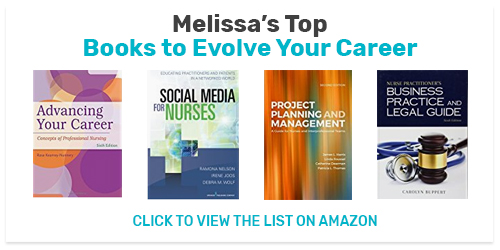The First Year: What You Need to Know During Your Transition from RN to NP

I still remember my first day on the job as a psychiatric nurse practitioner. The weeks leading up to my start date, I ordered the latest and greatest pharmacology books and reviewed my notes from school. That morning, I packed my favorite lunch and donned a brand new, extra white lab coat with Dr. DeCapua, DNP embroidered across the front. I was nervous but prepared. I had made the transition from RN to NP!
The first year out of nurse practitioner school was–to say the least–exhausting. You hear people talk about that “steep” learning curve, but I’d argue that it’s not so much steep as it is an exponential growth surpassing the speed of light. Close your eyes for a second, and you’ll wake up 12 months later with more expertise than you’d ever imagine. And, that, is exhausting.
I’m writing this article to express a few things I wish I would have known going into my first year as an official nurse practitioner because when you’re official, there are no more professors hovering nearby. You’re (sort of) of your own, and you will undoubtedly have others’ lives hanging in the balance. Don’t worry, you’ve got this!
This article was originally written for Barton Associates.
Find a Mentor
A 2011 study published in the Journal of Professional Nursing demonstrates the necessity of effective mentoring for novice nurse practitioners. The authors of this study write, “Nurse practitioner (NP) programs excel in their ability to provide the didactic information and clinical exposure necessary for the beginning-level practitioner; however, additional guidance and support are essential for the novice NP to evolve into an expert clinical practitioner. To this end, mentorship is an effective transition strategy for novice NPs.”
Think of mentorship as your chance to learn beyond medical books, patient cases, and rote memorization. Your mentor can facilitate your transition by helping you navigate the complex healthcare system, hospital politics, and interpersonal conflicts. Finding a fellow nurse practitioner mentor is ideal, as he or she will likely understand your unique situation as not yet an expert practitioner.
Pick Your Employer Carefully
Research published in the Canadian Family Physician found that novice nurse practitioners were more likely to have a negative experience their first year if they worked for a company that did not understand the nurse practitioner role. Specifically, the authors wrote, “Lack of preparation for integrating NPs into clinical settings and lack of infrastructure, orientation, mentorship, and awareness of the NP role and needs made the transition difficult.” According to this study, one-third of nurse practitioners leave their first job due to interprofessional conflict with other healthcare workers who do not accept their role and expertise.
You must select your first employer carefully. Make sure they offer you a supportive environment with realistic professional expectations for a novice nurse practitioner. Ensure that your first employer knows what a nurse practitioner is and can articulate your scope of practice. Your first year is about you learning, growing, and caring for patients, not onboarding your employer to the nurse practitioner profession.
If your employer doesn’t understand nurse practitioners, you may find yourself doing registered nurse (RN) related skills. The employer should not expect you to perform the role of both an RN and nurse practitioner. Each profession has its own scope of practice and its own expertise. When accepting your first job, make sure your employer understands this difference and supports your transition.
On that note, make sure you understand that it’s a different job as well. As a nurse practitioner, you have a greater level of autonomy and thus greater responsibility. These are now your patients and you must diagnose and treat their conditions while leading that patient’s healthcare team. You’re advanced education and rigorous certification earned you the title of nurse practitioner. Own it!
Remember Why You Made the Transition from RN to NP
During your first year you’re going to feel stressed, overwhelmed at times, and tired. To counter this anxiety, reflect on your skills and qualifications. Remember that you’re in transition and not everything is going to go perfectly. Focus on what you’re learning and never forget why you became a nurse practitioner.
Every heard of “imposter syndrome?” It’s a phenomenon where you feel as though you’re not qualified for your job and you’ve somehow tricked everyone into believing otherwise. This is common after making the transition from RN to NP! And, the worst part, the moment when everyone figures out you’re a fraud is imminent. The weird thing about the phenomenon is that it occurs in those who are in fact extremely qualified and competent.
I’ll tell you a secret. During my first year, I was a nervous wreck! I worked in a large hospital system traveling among floors caring for different patients with severe mental illnesses. And I wasn’t just carrying my laptop and reference books with me. I carried all those feelings of imposter syndrome too.
My secret weapon was a beat-up piece of paper I kept hidden in my lab coat pocket. It was written my first day of nurse practitioner school and it listed why I decided to pursue this field. On those extra tough days, in between patient cases, I’d pull it out and remember why I was there.
Do More Than Clinical Work
Becoming an expert clinical practitioner is no simple endeavor; however, during your first year, don’t forget about other areas of medicine that interest you such as research, technology, policy, and leadership. You’re not limited to patient care, and to prevent burnout, you’ll want to make sure you have a variety of job tasks.
Are you fascinated with translational research? Build in time to conduct studies and implement changes to your practice. Are you interested in health technology and electronic medical records? Become a domain expert and collaborate with the user experience (UX) team to design better software interfaces. Are you a natural advocate or insurgent? Spend time campaigning for supportive politicians or lobbying for patient rights. Are you a natural leader, aspiring to be the next Chief Medical Officer? It’s not too early to take on leadership positions on your team or in your department.
Get Involved
Don’t isolate yourself! Get involved with the nurse practitioner profession. Start by joining the American Association of Nurse Practitioners. They are the one-stop shop for everything a novice nurse practitioner needs: mentorship opportunities, continuing education, networking events, and professional advocacy. It’s also important to join your local organization so you can remain connected with nurse practitioners who live nearby. Joining the nurse practitioner community can mitigate the anxiety from your transition and connect you with others going through the same thing.
Thoughts? Questions? Comment below or email me!
Share on Facebook Share on Twitter Share on Pinterest
10 Comments on "The First Year: What You Need to Know During Your Transition from RN to NP"